外研版(2019)选择性必修 第四册Unit1 Looking forwards Using language 课件(共30张PPT)
文档属性
| 名称 | 外研版(2019)选择性必修 第四册Unit1 Looking forwards Using language 课件(共30张PPT) |

|
|
| 格式 | pptx | ||
| 文件大小 | 1.9MB | ||
| 资源类型 | 教案 | ||
| 版本资源 | 外研版(2019) | ||
| 科目 | 英语 | ||
| 更新时间 | 2024-11-17 00:00:00 | ||
图片预览

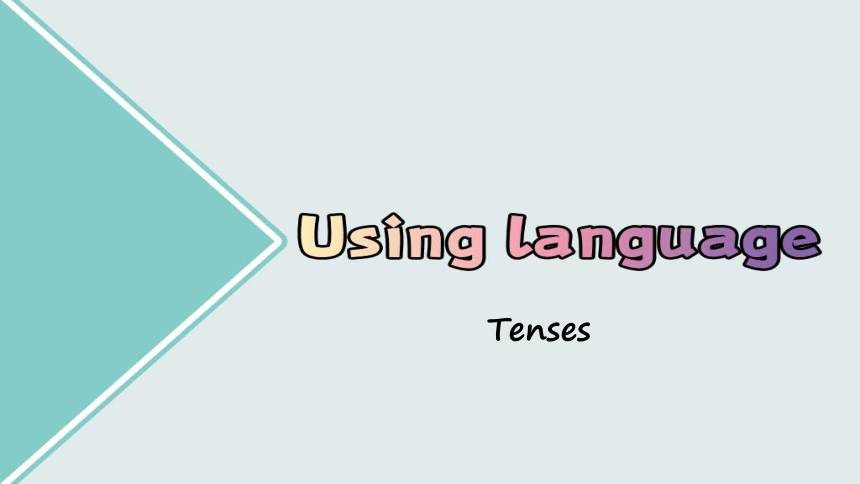
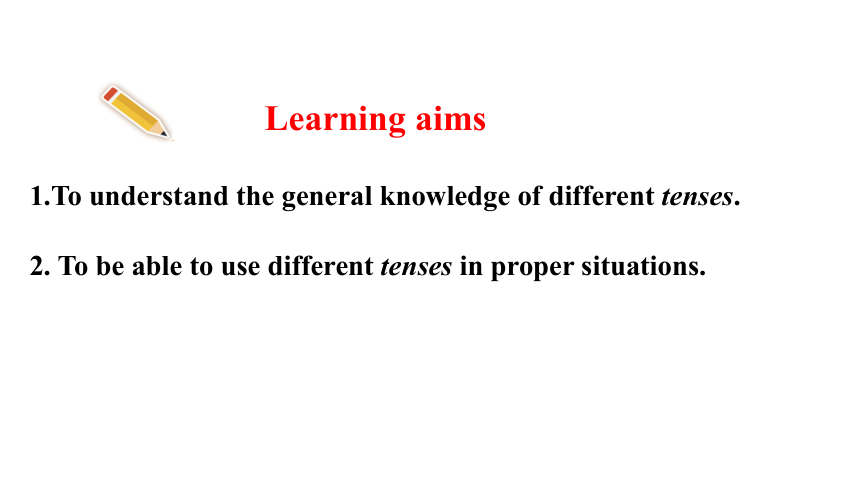
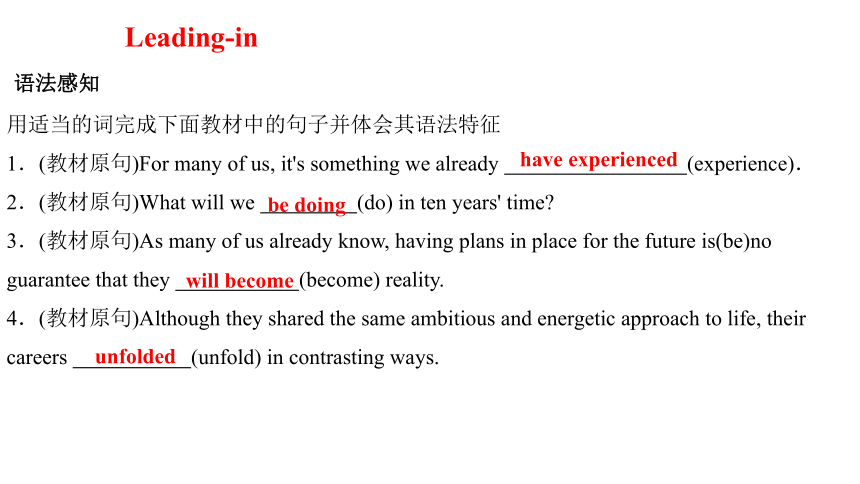
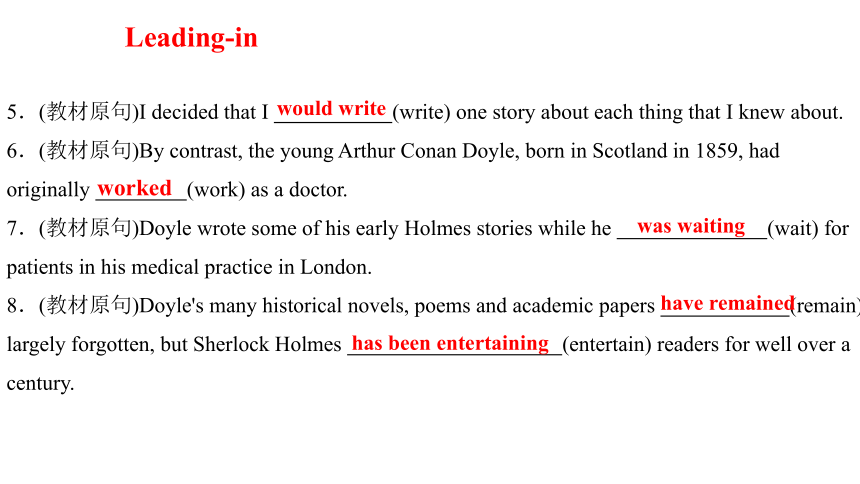
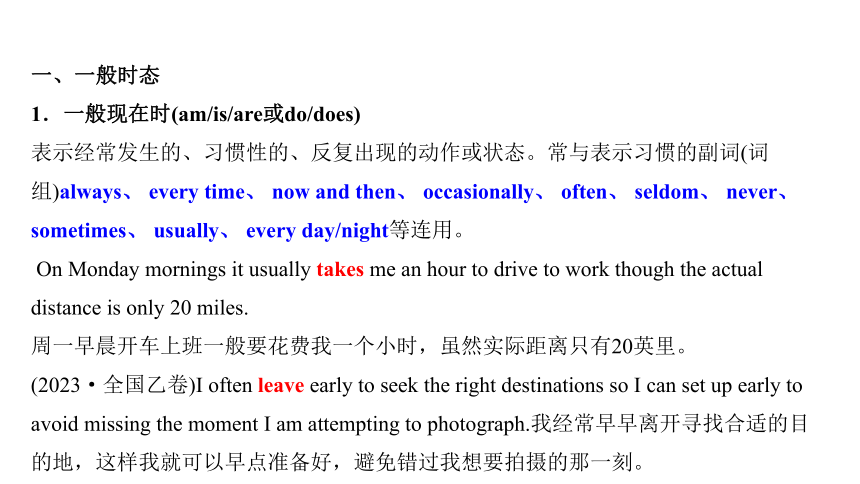
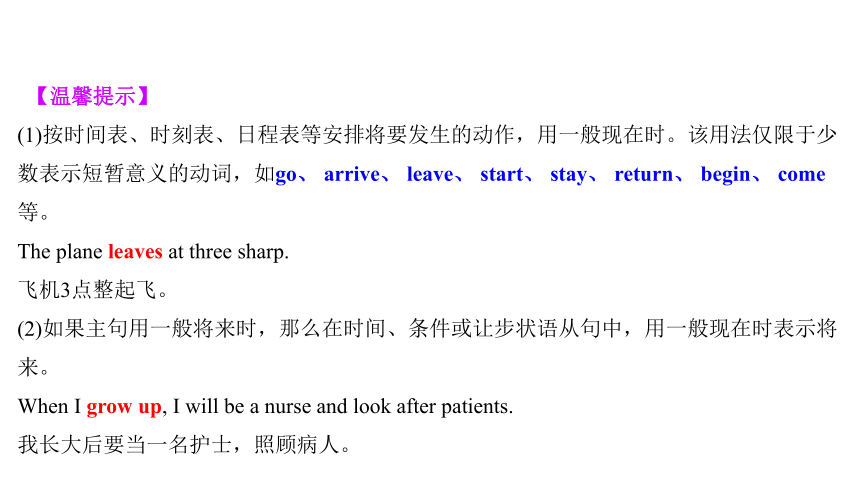

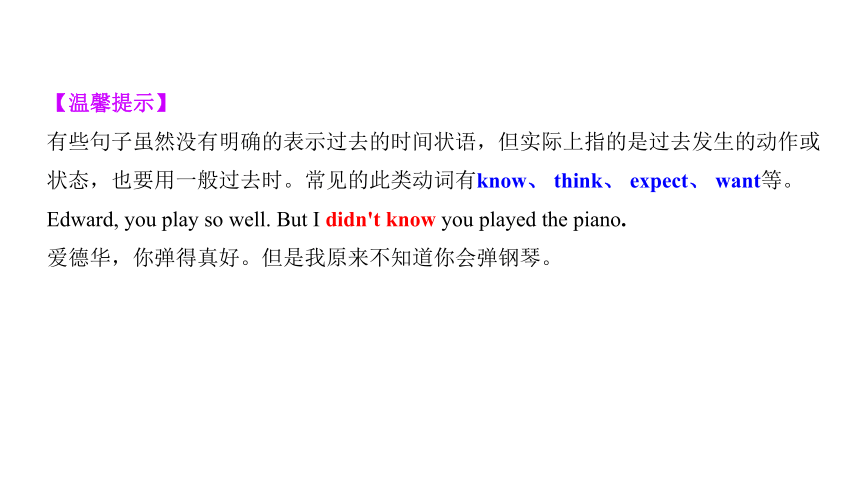
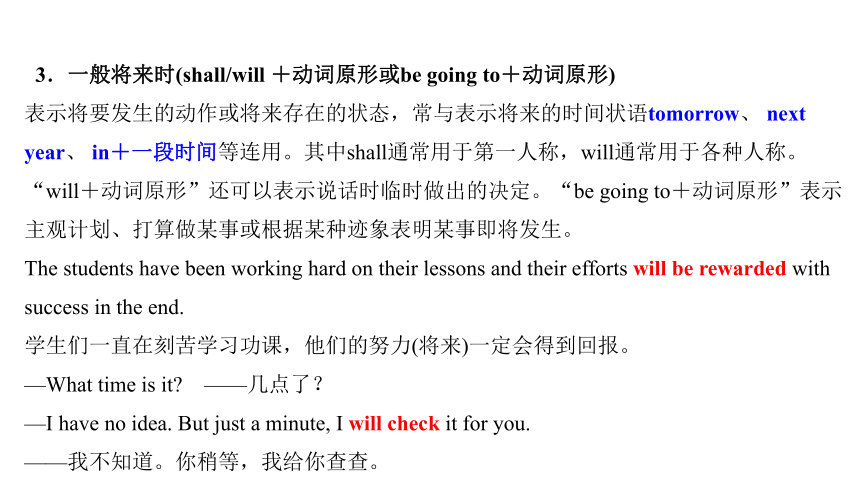
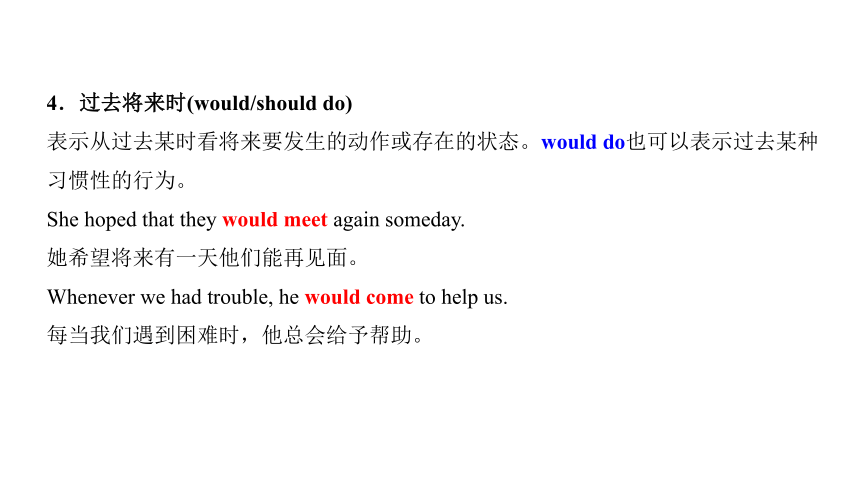
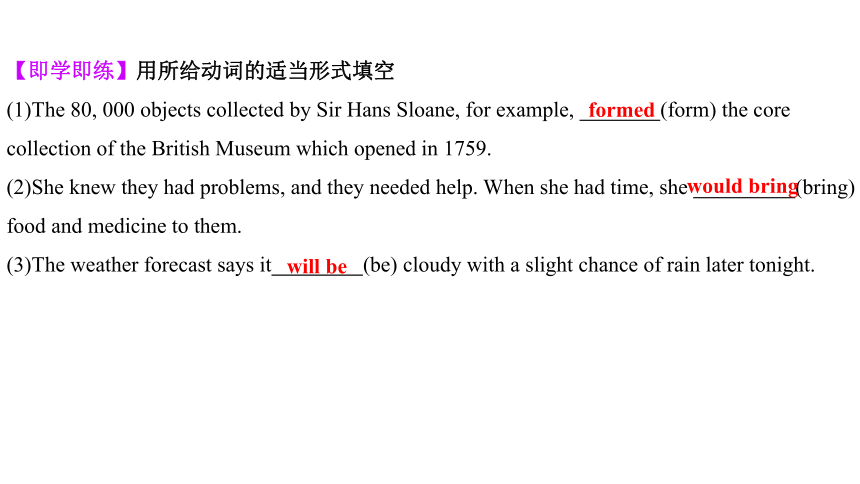
文档简介
(共30张PPT)
Looking forwards
Tenses
1.To understand the general knowledge of different tenses.
2. To be able to use different tenses in proper situations.
Learning aims
语法感知
用适当的词完成下面教材中的句子并体会其语法特征
1.(教材原句)For many of us, it's something we already (experience).
2.(教材原句)What will we (do) in ten years' time
3.(教材原句)As many of us already know, having plans in place for the future is(be)no guarantee that they (become) reality.
4.(教材原句)Although they shared the same ambitious and energetic approach to life, their careers (unfold) in contrasting ways.
Leading-in
have experienced
be doing
will become
unfolded
5.(教材原句)I decided that I (write) one story about each thing that I knew about.
6.(教材原句)By contrast, the young Arthur Conan Doyle, born in Scotland in 1859, had originally (work) as a doctor.
7.(教材原句)Doyle wrote some of his early Holmes stories while he (wait) for patients in his medical practice in London.
8.(教材原句)Doyle's many historical novels, poems and academic papers (remain) largely forgotten, but Sherlock Holmes (entertain) readers for well over a century.
Leading-in
would write
has been entertaining
was waiting
have remained
worked
一、一般时态
1.一般现在时(am/is/are或do/does)
表示经常发生的、习惯性的、反复出现的动作或状态。常与表示习惯的副词(词组)always、 every time、 now and then、 occasionally、 often、 seldom、 never、 sometimes、 usually、 every day/night等连用。
On Monday mornings it usually takes me an hour to drive to work though the actual distance is only 20 miles.
周一早晨开车上班一般要花费我一个小时,虽然实际距离只有20英里。
(2023·全国乙卷)I often leave early to seek the right destinations so I can set up early to avoid missing the moment I am attempting to photograph.我经常早早离开寻找合适的目的地,这样我就可以早点准备好,避免错过我想要拍摄的那一刻。
【温馨提示】
(1)按时间表、时刻表、日程表等安排将要发生的动作,用一般现在时。该用法仅限于少数表示短暂意义的动词,如go、 arrive、 leave、 start、 stay、 return、 begin、 come等。
The plane leaves at three sharp.
飞机3点整起飞。
(2)如果主句用一般将来时,那么在时间、条件或让步状语从句中,用一般现在时表示将来。
When I grow up, I will be a nurse and look after patients.
我长大后要当一名护士,照顾病人。
2.一般过去时(was/were或did)
表示过去一段时间内经常性或习惯性的动作。常与often、usually、seldom 等表示频度的副词连用。还可以表示在过去某一时间所发生的动作或存在的状态,与现在没有关系,常与yesterday、 the other day、 last week、 the day before yesterday等表示过去的时间状语连用。
A few months after he had arrived in China, Mr. Smith fell in love with the people and culture there.
史密斯先生到中国几个月后,就喜欢上了那里的人和文化。
【温馨提示】
有些句子虽然没有明确的表示过去的时间状语,但实际上指的是过去发生的动作或状态,也要用一般过去时。常见的此类动词有know、 think、 expect、 want等。
Edward, you play so well. But I didn't know you played the piano.
爱德华,你弹得真好。但是我原来不知道你会弹钢琴。
3.一般将来时(shall/will +动词原形或be going to+动词原形)
表示将要发生的动作或将来存在的状态,常与表示将来的时间状语tomorrow、 next year、 in+一段时间等连用。其中shall通常用于第一人称,will通常用于各种人称。“will+动词原形”还可以表示说话时临时做出的决定。“be going to+动词原形”表示主观计划、打算做某事或根据某种迹象表明某事即将发生。
The students have been working hard on their lessons and their efforts will be rewarded with success in the end.
学生们一直在刻苦学习功课,他们的努力(将来)一定会得到回报。
—What time is it ——几点了?
—I have no idea. But just a minute, I will check it for you.
——我不知道。你稍等,我给你查查。
4.过去将来时(would/should do)
表示从过去某时看将来要发生的动作或存在的状态。would do也可以表示过去某种习惯性的行为。
She hoped that they would meet again someday.
她希望将来有一天他们能再见面。
Whenever we had trouble, he would come to help us.
每当我们遇到困难时,他总会给予帮助。
【即学即练】用所给动词的适当形式填空
(1)The 80, 000 objects collected by Sir Hans Sloane, for example, (form) the core collection of the British Museum which opened in 1759.
(2)She knew they had problems, and they needed help. When she had time, she (bring) food and medicine to them.
(3)The weather forecast says it (be) cloudy with a slight chance of rain later tonight.
formed
would bring
will be
二、进行时态
1.现在进行时(am/is/are doing)
表示说话时正在进行或表示现阶段正在进行的动作。
We are facing today a strange new world and we are all wondering what we are going to do with it.
我们今天面对的是一个陌生的新世界,并且我们都在想我们要做什么。
【温馨提示】
(1)现在进行时可以表示按计划或安排即将发生的动作,常限于go、 come、 leave、 start、 arrive、 return、 work、 sleep、 stay、 have、 wear、 run out等动词(短语)。
Food supplies in the flood stricken area are running out. We must act immediately before there's none left.
洪灾区的食物供给快要用完了。我们必须在食物吃完前马上行动。
(2)当现在进行时与频度副词always、 forever、 continually、 constantly等连用时强调重复的动作,表示某种感彩(如赞许、厌烦、满意等)。
The students are making progress constantly.
学生们在不断进步。
2.过去进行时(was/were doing)
表示在过去某一时刻或某一段时间内正在进行的动作,常同表示过去的时间状语at that time、 at that moment、 at this time yesterday、 at ten o'clock yesterday等连用。
Susan had quit her well paid job and was working as a volunteer in the neighborhood when I visited her last year.
去年当我探望苏珊的时候,她已经辞去了报酬丰厚的工作,正在一个社区里做志愿者。
【温馨提示】
过去进行时在含有时间状语从句的复合句中,表示一个过去的动作发生时或发生之后,另一个动作正在进行。
Jack was working in the lab when the power cut occurred.
突然停电时,杰克正在实验室里工作。
3.将来进行时(will be doing)
表示将来某一时刻或某一段时间正在发生或进行的动作,常与一些标志性的时间状语连用,如at this time tomorrow、by then、 from 1:30 to 4:30 tomorrow等。
Please don't call me between 8:00 and 10:00 tomorrow. I will be having my classes then.
明天8点到10点之间请不要给我打电话,我那时正在上课。
(2021·浙江高考)At home, my dad said, “A job’s a big step to growing up.I’m glad you will be contributing to the household.”
在家我爸爸说:“找到工作是成长的一大步。我很高兴在不久的将来就可以为我们的家庭做出贡献了。”
【即学即练】用所给动词的适当形式填空
(1)I (drive) down to London when I suddenly found that I was on the wrong road.
(2)—Hi, let's go skating.
—Sorry, I'm busy right now. I (fill) in an application form for a new job.
(3)Daniel's family (enjoy) their holiday in Mount Huang this time next week.
am filling
will be enjoying
was driving
三、完成时态
1.现在完成时(has/have done)
(1)表示过去发生的动作或事情对现在造成的影响或产生的结果,这一用法实际上表示的是因果关系,动作的完成是因,现在的情况是果。常用的时间状语有already、 just、 yet、 never、 before、 lately、 recently、 ever、never、often等。
Cities such as Shanghai, Shenzhen and Guangzhou already have given more permanent resident permits to migrants.
上海、深圳和广州等大城市已经向外地人授予长期居住证。
(2023·全国乙卷)I have missed plenty of beautiful sunsets/sunrises due to being on the spot only five minutes before the best moment.我错过了很多美丽的日落/日出,因为我只在最佳时刻到来前五分钟到了现场。
(2)表示从过去某时开始而延续至今(可能还要延续下去)的动作或状态。常用的时间状语:since+过去时间点、 for+时间段、so far、in the last/past few years、in recent years、up to now、these few days等。
His first novel has received good reviews since it came out last month.
他的第一部小说自上个月出版以来获得了许多好评。
(3)在条件和时间状语从句中,用现在完成时表示将来某个时间前已经完成的动作。
Will you come to my office when you have finished your work
你完成工作后能到我办公室来一下吗?
【温馨提示】
(1)一般过去时和现在完成时的区别:
一般过去时 用于叙述过去的动作,与现在无关
现在完成时 所叙述的动作发生在过去某个或某段时间,该动作与现在有关系,可能对现在产生影响,也可能一直持续下去
Mr. Smith has lived in Beijing for 5 years.(现在还在北京住着)
Mr. Smith lived in Beijing for 5 years.(现在已不在北京住着了)
(2)下列句型中常用现在完成时:
①This/That/It is/will be the first (second/...)time +that从句;
②This/That/ It is the +最高级+名词+that从句。
This is the first time I have flown to Shanghai.这是我第一次飞往上海。
This is the most interesting novel he has ever written.这是他所写的最有趣的一部小说。
2.过去完成时(had done)
(1)表示在过去某一时刻或某一动作之前完成的动作或存在的状态,即“过去的过去”。句中一般有明确的表示“过去的过去”的时间状语(从句)。
When walking down the street, I came across David, whom I hadn't seen for years.
当沿着街道散步的时候,我遇见了多年未见的戴维。
(2)表示从过去某一时间开始,一直延续到过去的另一时间的动作或状态,常用的时间状语有before、 by then、 by that time、 by the end of、 by the time+从句等。
It took me a long time before I was able to fully appreciate what they had done for me.
很久以后我才能够完全领会到他们为我做的一切。
(2024·全国甲卷)I had just finished reading The Mill on the Floss by George Eliot, and I was heartbroken with the ending.我刚读完乔治·艾略特的《牙线上的磨坊》,结局让我心碎。
(3)表示“愿望、打算”的动词(如hope、 want、 expect、 think、 mean、 suppose、 plan、 intend)用于过去完成时表示过去本打算实现而未实现的希望或计划。
He had hoped to continue as a full time career officer.
他原本希望继续当全职的职业事务员。
【温馨提示】常使用过去完成时的句型:
①This/It/That was the first (second/...) time+that从句;
②It/This was the+最高级+名词+that从句;
③hardly...when.../no sooner...than...(一……就……) 主句用过去完成时,从句用一般过去时。
3.将来完成时(shall/will have done)
表示将来某时之前或某动作之前已经完成的动作,或一个持续到将来某时或某动作发生之前的动作。
I shall have finished the report by next Friday.
到下周五我就完成这份报告了。
By next Monday, she will have studied here for three years.
到下周一,她在这里学习就要满三年了。
【即学即练】用所给动词的适当形式填空
(1)Hopefully in 2025 we will no longer be e mailing each other, for we _____________________(develop) more convenient electronic communication tools by then.
(2)By the end of last month, we (review) four books.
(3)We (achieve) great successes in the cause of building up our country in the past few years.
had reviewed
have achieved
will have developed
四、完成进行时态
现在完成进行时(has/have been doing)
(1)表示过去某一时刻之前开始的动作或存在的状态一直延续到现在,并有可能继续下去,常见的时间状语有all this morning、 this month、 these few days、 since和for引导的状语从句等。
I have been learning German since five years ago.
五年来我一直在学德语。
(2)所表示的动作有时并不是一直在不停地进行,而是在断断续续地重复。
I have been visiting some cities of China this month.
这个月我一直在参观中国的一些城市。
【即学即练】用所给动词的适当形式填空
(1)He (prepare) for the contest for months, so he is sure to win the first prize.
(2)Since the time humankind started gardening, we (try) to make our environment more beautiful.
(3)The manager (tell) the workers how to improve the program since 9:00 am.
(4) (2023·全国甲卷)Bo.Lan (make) waves in Bangkok’s culinary scene since it opened in 2009.
have been trying
has been telling
has been preparing
has been making
Summary
Ⅰ.单句语法填空
1.In order to enrich our campus life, our school (organize) a 5 km cross country running race last Sunday.
2.Luckily, I (go) home in two weeks for summer vacation.
3.By mid 1963, the Beatles (be) extremely popular in England.
4.In the past few years, China (make) great contributions to environmental protection.
5.Tom went to his room after lunch and (write) his essay there ever since.
6.Now China (push) for a larger role in global economic policy making.
7.This time next week we (work) in that factory.
organized
had been
has made
has been writing
shall/will be working
will go
is pushing
Ⅱ.完成句子
1.老师走进教室的时候,学生们正在谈论当天的新闻。
When the teacher came into the classroom, the students .
2.她在同学中很受欢迎,因为她总是帮助别人。
She is popular among her classmates because she .
3.为了让生活丰富多彩,我的姐姐经常参加课外活动。
To live a colorful life, my sister often .
4.自九岁起他就开始收集各种各样的邮票。
He since he was nine years old.
5.近年来,人们的生活方式发生了巨大的变化。
In recent years, great changes in the way people live.
were talking about that day’s news
is always helping others
participates in after class activities
have taken place
has been collecting all kinds of stamps
A fall into the pit, a gain in your wit.
吃一堑,长一智。
Looking forwards
Tenses
1.To understand the general knowledge of different tenses.
2. To be able to use different tenses in proper situations.
Learning aims
语法感知
用适当的词完成下面教材中的句子并体会其语法特征
1.(教材原句)For many of us, it's something we already (experience).
2.(教材原句)What will we (do) in ten years' time
3.(教材原句)As many of us already know, having plans in place for the future is(be)no guarantee that they (become) reality.
4.(教材原句)Although they shared the same ambitious and energetic approach to life, their careers (unfold) in contrasting ways.
Leading-in
have experienced
be doing
will become
unfolded
5.(教材原句)I decided that I (write) one story about each thing that I knew about.
6.(教材原句)By contrast, the young Arthur Conan Doyle, born in Scotland in 1859, had originally (work) as a doctor.
7.(教材原句)Doyle wrote some of his early Holmes stories while he (wait) for patients in his medical practice in London.
8.(教材原句)Doyle's many historical novels, poems and academic papers (remain) largely forgotten, but Sherlock Holmes (entertain) readers for well over a century.
Leading-in
would write
has been entertaining
was waiting
have remained
worked
一、一般时态
1.一般现在时(am/is/are或do/does)
表示经常发生的、习惯性的、反复出现的动作或状态。常与表示习惯的副词(词组)always、 every time、 now and then、 occasionally、 often、 seldom、 never、 sometimes、 usually、 every day/night等连用。
On Monday mornings it usually takes me an hour to drive to work though the actual distance is only 20 miles.
周一早晨开车上班一般要花费我一个小时,虽然实际距离只有20英里。
(2023·全国乙卷)I often leave early to seek the right destinations so I can set up early to avoid missing the moment I am attempting to photograph.我经常早早离开寻找合适的目的地,这样我就可以早点准备好,避免错过我想要拍摄的那一刻。
【温馨提示】
(1)按时间表、时刻表、日程表等安排将要发生的动作,用一般现在时。该用法仅限于少数表示短暂意义的动词,如go、 arrive、 leave、 start、 stay、 return、 begin、 come等。
The plane leaves at three sharp.
飞机3点整起飞。
(2)如果主句用一般将来时,那么在时间、条件或让步状语从句中,用一般现在时表示将来。
When I grow up, I will be a nurse and look after patients.
我长大后要当一名护士,照顾病人。
2.一般过去时(was/were或did)
表示过去一段时间内经常性或习惯性的动作。常与often、usually、seldom 等表示频度的副词连用。还可以表示在过去某一时间所发生的动作或存在的状态,与现在没有关系,常与yesterday、 the other day、 last week、 the day before yesterday等表示过去的时间状语连用。
A few months after he had arrived in China, Mr. Smith fell in love with the people and culture there.
史密斯先生到中国几个月后,就喜欢上了那里的人和文化。
【温馨提示】
有些句子虽然没有明确的表示过去的时间状语,但实际上指的是过去发生的动作或状态,也要用一般过去时。常见的此类动词有know、 think、 expect、 want等。
Edward, you play so well. But I didn't know you played the piano.
爱德华,你弹得真好。但是我原来不知道你会弹钢琴。
3.一般将来时(shall/will +动词原形或be going to+动词原形)
表示将要发生的动作或将来存在的状态,常与表示将来的时间状语tomorrow、 next year、 in+一段时间等连用。其中shall通常用于第一人称,will通常用于各种人称。“will+动词原形”还可以表示说话时临时做出的决定。“be going to+动词原形”表示主观计划、打算做某事或根据某种迹象表明某事即将发生。
The students have been working hard on their lessons and their efforts will be rewarded with success in the end.
学生们一直在刻苦学习功课,他们的努力(将来)一定会得到回报。
—What time is it ——几点了?
—I have no idea. But just a minute, I will check it for you.
——我不知道。你稍等,我给你查查。
4.过去将来时(would/should do)
表示从过去某时看将来要发生的动作或存在的状态。would do也可以表示过去某种习惯性的行为。
She hoped that they would meet again someday.
她希望将来有一天他们能再见面。
Whenever we had trouble, he would come to help us.
每当我们遇到困难时,他总会给予帮助。
【即学即练】用所给动词的适当形式填空
(1)The 80, 000 objects collected by Sir Hans Sloane, for example, (form) the core collection of the British Museum which opened in 1759.
(2)She knew they had problems, and they needed help. When she had time, she (bring) food and medicine to them.
(3)The weather forecast says it (be) cloudy with a slight chance of rain later tonight.
formed
would bring
will be
二、进行时态
1.现在进行时(am/is/are doing)
表示说话时正在进行或表示现阶段正在进行的动作。
We are facing today a strange new world and we are all wondering what we are going to do with it.
我们今天面对的是一个陌生的新世界,并且我们都在想我们要做什么。
【温馨提示】
(1)现在进行时可以表示按计划或安排即将发生的动作,常限于go、 come、 leave、 start、 arrive、 return、 work、 sleep、 stay、 have、 wear、 run out等动词(短语)。
Food supplies in the flood stricken area are running out. We must act immediately before there's none left.
洪灾区的食物供给快要用完了。我们必须在食物吃完前马上行动。
(2)当现在进行时与频度副词always、 forever、 continually、 constantly等连用时强调重复的动作,表示某种感彩(如赞许、厌烦、满意等)。
The students are making progress constantly.
学生们在不断进步。
2.过去进行时(was/were doing)
表示在过去某一时刻或某一段时间内正在进行的动作,常同表示过去的时间状语at that time、 at that moment、 at this time yesterday、 at ten o'clock yesterday等连用。
Susan had quit her well paid job and was working as a volunteer in the neighborhood when I visited her last year.
去年当我探望苏珊的时候,她已经辞去了报酬丰厚的工作,正在一个社区里做志愿者。
【温馨提示】
过去进行时在含有时间状语从句的复合句中,表示一个过去的动作发生时或发生之后,另一个动作正在进行。
Jack was working in the lab when the power cut occurred.
突然停电时,杰克正在实验室里工作。
3.将来进行时(will be doing)
表示将来某一时刻或某一段时间正在发生或进行的动作,常与一些标志性的时间状语连用,如at this time tomorrow、by then、 from 1:30 to 4:30 tomorrow等。
Please don't call me between 8:00 and 10:00 tomorrow. I will be having my classes then.
明天8点到10点之间请不要给我打电话,我那时正在上课。
(2021·浙江高考)At home, my dad said, “A job’s a big step to growing up.I’m glad you will be contributing to the household.”
在家我爸爸说:“找到工作是成长的一大步。我很高兴在不久的将来就可以为我们的家庭做出贡献了。”
【即学即练】用所给动词的适当形式填空
(1)I (drive) down to London when I suddenly found that I was on the wrong road.
(2)—Hi, let's go skating.
—Sorry, I'm busy right now. I (fill) in an application form for a new job.
(3)Daniel's family (enjoy) their holiday in Mount Huang this time next week.
am filling
will be enjoying
was driving
三、完成时态
1.现在完成时(has/have done)
(1)表示过去发生的动作或事情对现在造成的影响或产生的结果,这一用法实际上表示的是因果关系,动作的完成是因,现在的情况是果。常用的时间状语有already、 just、 yet、 never、 before、 lately、 recently、 ever、never、often等。
Cities such as Shanghai, Shenzhen and Guangzhou already have given more permanent resident permits to migrants.
上海、深圳和广州等大城市已经向外地人授予长期居住证。
(2023·全国乙卷)I have missed plenty of beautiful sunsets/sunrises due to being on the spot only five minutes before the best moment.我错过了很多美丽的日落/日出,因为我只在最佳时刻到来前五分钟到了现场。
(2)表示从过去某时开始而延续至今(可能还要延续下去)的动作或状态。常用的时间状语:since+过去时间点、 for+时间段、so far、in the last/past few years、in recent years、up to now、these few days等。
His first novel has received good reviews since it came out last month.
他的第一部小说自上个月出版以来获得了许多好评。
(3)在条件和时间状语从句中,用现在完成时表示将来某个时间前已经完成的动作。
Will you come to my office when you have finished your work
你完成工作后能到我办公室来一下吗?
【温馨提示】
(1)一般过去时和现在完成时的区别:
一般过去时 用于叙述过去的动作,与现在无关
现在完成时 所叙述的动作发生在过去某个或某段时间,该动作与现在有关系,可能对现在产生影响,也可能一直持续下去
Mr. Smith has lived in Beijing for 5 years.(现在还在北京住着)
Mr. Smith lived in Beijing for 5 years.(现在已不在北京住着了)
(2)下列句型中常用现在完成时:
①This/That/It is/will be the first (second/...)time +that从句;
②This/That/ It is the +最高级+名词+that从句。
This is the first time I have flown to Shanghai.这是我第一次飞往上海。
This is the most interesting novel he has ever written.这是他所写的最有趣的一部小说。
2.过去完成时(had done)
(1)表示在过去某一时刻或某一动作之前完成的动作或存在的状态,即“过去的过去”。句中一般有明确的表示“过去的过去”的时间状语(从句)。
When walking down the street, I came across David, whom I hadn't seen for years.
当沿着街道散步的时候,我遇见了多年未见的戴维。
(2)表示从过去某一时间开始,一直延续到过去的另一时间的动作或状态,常用的时间状语有before、 by then、 by that time、 by the end of、 by the time+从句等。
It took me a long time before I was able to fully appreciate what they had done for me.
很久以后我才能够完全领会到他们为我做的一切。
(2024·全国甲卷)I had just finished reading The Mill on the Floss by George Eliot, and I was heartbroken with the ending.我刚读完乔治·艾略特的《牙线上的磨坊》,结局让我心碎。
(3)表示“愿望、打算”的动词(如hope、 want、 expect、 think、 mean、 suppose、 plan、 intend)用于过去完成时表示过去本打算实现而未实现的希望或计划。
He had hoped to continue as a full time career officer.
他原本希望继续当全职的职业事务员。
【温馨提示】常使用过去完成时的句型:
①This/It/That was the first (second/...) time+that从句;
②It/This was the+最高级+名词+that从句;
③hardly...when.../no sooner...than...(一……就……) 主句用过去完成时,从句用一般过去时。
3.将来完成时(shall/will have done)
表示将来某时之前或某动作之前已经完成的动作,或一个持续到将来某时或某动作发生之前的动作。
I shall have finished the report by next Friday.
到下周五我就完成这份报告了。
By next Monday, she will have studied here for three years.
到下周一,她在这里学习就要满三年了。
【即学即练】用所给动词的适当形式填空
(1)Hopefully in 2025 we will no longer be e mailing each other, for we _____________________(develop) more convenient electronic communication tools by then.
(2)By the end of last month, we (review) four books.
(3)We (achieve) great successes in the cause of building up our country in the past few years.
had reviewed
have achieved
will have developed
四、完成进行时态
现在完成进行时(has/have been doing)
(1)表示过去某一时刻之前开始的动作或存在的状态一直延续到现在,并有可能继续下去,常见的时间状语有all this morning、 this month、 these few days、 since和for引导的状语从句等。
I have been learning German since five years ago.
五年来我一直在学德语。
(2)所表示的动作有时并不是一直在不停地进行,而是在断断续续地重复。
I have been visiting some cities of China this month.
这个月我一直在参观中国的一些城市。
【即学即练】用所给动词的适当形式填空
(1)He (prepare) for the contest for months, so he is sure to win the first prize.
(2)Since the time humankind started gardening, we (try) to make our environment more beautiful.
(3)The manager (tell) the workers how to improve the program since 9:00 am.
(4) (2023·全国甲卷)Bo.Lan (make) waves in Bangkok’s culinary scene since it opened in 2009.
have been trying
has been telling
has been preparing
has been making
Summary
Ⅰ.单句语法填空
1.In order to enrich our campus life, our school (organize) a 5 km cross country running race last Sunday.
2.Luckily, I (go) home in two weeks for summer vacation.
3.By mid 1963, the Beatles (be) extremely popular in England.
4.In the past few years, China (make) great contributions to environmental protection.
5.Tom went to his room after lunch and (write) his essay there ever since.
6.Now China (push) for a larger role in global economic policy making.
7.This time next week we (work) in that factory.
organized
had been
has made
has been writing
shall/will be working
will go
is pushing
Ⅱ.完成句子
1.老师走进教室的时候,学生们正在谈论当天的新闻。
When the teacher came into the classroom, the students .
2.她在同学中很受欢迎,因为她总是帮助别人。
She is popular among her classmates because she .
3.为了让生活丰富多彩,我的姐姐经常参加课外活动。
To live a colorful life, my sister often .
4.自九岁起他就开始收集各种各样的邮票。
He since he was nine years old.
5.近年来,人们的生活方式发生了巨大的变化。
In recent years, great changes in the way people live.
were talking about that day’s news
is always helping others
participates in after class activities
have taken place
has been collecting all kinds of stamps
A fall into the pit, a gain in your wit.
吃一堑,长一智。
